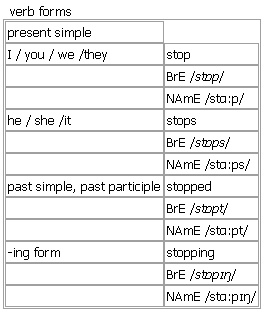|
Từ điển Oxford Advanced Learner 8th
 stop
stop

stop [stop stops stopped stopping] verb, noun BrE [stɒp] NAmE [stɑːp]
verb (-pp-)
NOT MOVE
1. intransitive, transitive to no longer move; to make sb/sth no longer move
• The car stopped at the traffic lights.
• Ann stopped in front of the house.
•This train doesn't stop at Oxford.
•We stopped for the night in Port Augusta.
•~ sb/sth He was stopped by the police for speeding.
NOT CONTINUE
2. intransitive, transitive to no longer continue to do sth; to make sb/sth no longer do sth
•~ (doing sth) That phone never stops ringing!
• Please stop crying and tell me what's wrong.
•She criticizes everyone and the trouble is, she doesn't know when to stop.
•Can't you just stop?
•~ sb/sth Stop me (= make me stop talking) if I'm boring you.
•Stop it! You're hurting me.
•~ what… Mike immediately stopped what he was doing. Notice the difference between stop doing sth and stop to do sth
•We stopped taking pictures means ‘We were no longer taking pictures.’; We stopped to take pictures means ‘We stopped what we were doing so that we could start taking pictures.’
END
3. intransitive, transitive to end or finish; to make sth end or finish
• When is this fighting going to stop?
• The bus service stops at midnight.
•~ doing sth Has it stopped raining yet?
•~ sth Doctors couldn't stop the bleeding.
•The referee was forced to stop the game because of heavy snow.
PREVENT
4. transitive to prevent sb from doing sth; to prevent sth from happening
•~ sb/sth I want to go and you can't stop me.
• We need more laws to stop pollution.
•There's no stopping us now (= nothing can prevent us from achieving what we want to achieve).
•~ sb/sth from doing sth There's nothing to stop you from accepting the offer.
•You can't stop people from saying what they think.
• (BrE also)~ sb/sth doing sth You can't stop people saying what they think.
FOR SHORT TIME
intransitive
5. to end an activity for a short time in order to do sth
•~ for sth I'm hungry. Let's stop for lunch.
•~ to do sth We stopped to admire the scenery.
•People just don't stop to think about the consequences. In spoken English, stop can be used with and plus another verb, instead of with to and the infinitive, to show purpose
•He stopped and bought some flowers.
•Let's stop and look at the map.
NOT FUNCTION
6. intransitive, transitive to no longer work or function; to make sth no longer work or function
• Why has the engine stopped?
• What time is it? My watch has stopped.
•I felt as if my heart had stopped.
•~ sth I stopped the tape and pressed rewind.
•Can you stop the printer once it's started?
STAY
7. intransitive (BrE, informal)to stay somewhere for a short time, especially at sb's house
• I'm not stopping. I just came to give you this message.
•~ for sth Can you stop for tea?
MONEY
8. transitive to prevent money from being paid
•~ sth to stop a cheque (= tell the bank not to pay it)
•~ sth from sth (BrE)Dad threatened to stop £1 a week from our pocket money if we didn't clean our rooms.
CLOSE HOLE
9. transitive ~ sth (up) (with sth) to block, fill or close a hole, an opening, etc
•Stop up the other end of the tube, will you?
•I stopped my ears but still heard her cry out.
more at the buck stops here at ↑buck n., stop/halt sb in their tracksstop/halt/freeze in your tracks at ↑track n.
Verb forms: 
Word Origin:
Old English (for)stoppian ‘block up (an aperture)’, of West Germanic origin; related to German stopfen, from late Latin stuppare ‘to stuff’.
Thesaurus:
stop verb
1. I, T
•The car stopped in front of the house.
park • • pull up • • pull (sb/sth) over • |especially written halt •
stop/park/halt a car
stop/park a bus/cab/vehicle
a car/driver stops/parks/pulls up/pulls over
a train stops/halts
2. T, I
•The phone never stops ringing!
give sth up • • abandon • • drop • |informal leave off • • knock off (sth) • • pack sth in • |especially AmE, informal quit • |formal cease • • discontinue •
Opp: start
stop/give up/leave off/quit/cease doing sth
stop/give up/abandon/drop/leave off/quit/cease what you are doing
stop/give up/abandon/leave off/knock off/quit/cease work
3. I, T
•When will this fighting stop?
end • • finish • |formal conclude • • terminate •
Opp: start
almost/nearly/effectively stop/end/finish/conclude/terminate
virtually/all but/never stop/end/finish/conclude/terminate
stop/end/finish/conclude/terminate at last/eventually/finally
Stop, end, finish or conclude? End, finish and conclude are used especially about things that you do not expect to start again
•The war ended in 1945.
• The concert should finish by 10 o'clock.
• She concluded her speech with a quotation from Shakespeare.
Stop is used about things that may or will start again
•The rain stopped for a couple of hours.
4. T
•Doctors couldn't stop the bleeding.
halt • • stem • • put a stop to sth • • suspend •
Opp: start
stop/halt/stem/suspend the flow (of sth)
stop/halt/stem the progress/development/advance/expansion/spread/decline/slide (of sth)
stop/halt/put a stop to/suspend the plans/an activity/a practice
5. T
•Protesters failed to stop the tests from going ahead.
prevent • • keep sb from sth • • thwart • • frustrate • • avoid • • rule sb/sth out • |written restrain • • avert • |formal preclude • |especially journalism foil •
stop/prevent/keep/restrain/preclude sb/sth from doing sth
stop (sb/sth)/prevent sb/sth/avoid (sb/sth)/preclude (sb/sth) doing sth
stop/prevent/avoid/avert a/an crisis/accident
Stop or prevent? Prevent is a more formal word. It suggests action that sb plans in advance so that sth does not even start; stop often suggests action taken to end sth already in progress.
Example Bank:
•He couldn't stop thinking about her.
•He never knows when to stop.
•He's dangerous and needs to be stopped.
•I was enjoying myself so much I didn't want to stop.
•Suddenly he stopped dead: what was he doing?
•The question stopped Alice dead in her tracks.
•The sobs came less frequently, then stopped altogether.
•They tried to stop me from leaving.
•We need to stop making excuses.
•When is the violence going to stop?
•After three weeks we had stopped expecting to hear any news.
•Can't you just stop?
•Doctors couldn't stop the bleeding.
•I want to go and you can't stop me.
•I'm not stopping. I just came to give you this message.
•Measures must be taken to stop the spread of the virus.
•Please stop crying and tell me what's wrong.
•She criticizes everyone and the trouble is, she doesn't know when to stop.
•Stop it! You're hurting me.
•Stop me if I'm boring you.
•Stop up the other end of the hose, will you?
•Suddenly he stopped dead in his tracks: what was he doing?
•The activists failed to stop the tests from going ahead.
•The buses stop outside the school.
•There's nothing to stop you from accepting the offer.
•This train doesn't stop at Royston.
•This violence has got to be stopped.
•We stopped taking pictures.
•We stopped to take pictures.
•You can't stop people from saying what they think.
Idioms: ↑stop at nothing ▪ ↑stop short ▪ ↑stop short of of doing something ▪ ↑stop somebody short ▪ ↑stop the clock
Derived: ↑stop by ▪ ↑stop in ▪ ↑stop off ▪ ↑stop out ▪ ↑stop over ▪ ↑stop up
noun
ACT OF STOPPING
1. an act of stopping or stopping sth; the state of being stopped
• The trip included an overnight stop in Brussels.
• She brought the car to a stop.
•Work has temporarily come to a stop while the funding is reviewed.
•It is time to put a stop to the violence.
•Babies do not grow at a steady rate but in stops and starts.
see also ↑non-stop, ↑whistle-stop
OF BUS/TRAIN
2. a place where a bus or train stops regularly for passengers to get on or off
• I get off at the next stop.
• Is this your stop?
•Winchester will be the next station stop.
see also ↑bus stop, ↑pit stop, ↑request stop
PUNCTUATION
3. (BrE) = ↑full stop
MUSIC
4. a row of pipes on an organ that produce the different sounds
5. a handle on an organ that the player pushes in or pulls out to control the sound produced by the pipes
PHONETICS
6. a speech sound made by stopping the flow of air coming out of the mouth and then suddenly releasing it, for example /[p, k, t] /
Syn: ↑plosive
see also ↑glottal stop
see come to a full stop at ↑full stop, pull out all the stops at ↑pull v.
Word Origin:
Old English (for)stoppian ‘block up (an aperture)’, of West Germanic origin; related to German stopfen, from late Latin stuppare ‘to stuff’.
Thesaurus:
stop noun
1. C
•Work came to a stop.
especially written, especially business halt • • standstill •
a/an abrupt/sudden/complete/total stop/halt/standstill
a/an brief/unscheduled/immediate stop/halt
come/bring sth to a stop/halt/standstill
draw/jolt/screech/shudder/skid to a stop/halt
Stop or halt? A stop is gentler than a halt and more likely to be planned:
•a lunch stop
• a stop for refreshments
✗ a lunch halt
• ✗ a halt for refreshments
You can bring a vehicle to a stop/halt or it can come to a stop/halt. You can put a stop to sth that is wrong or call a halt to sth that is not worth doing.
2.
•I'm getting off at the next stop.
station • • bus stop • • destination •
arrive at the/your stop/station/bus stop/destination
get off at a stop/station
Example Bank:
•Between twelve and two everything comes to a dead stop.
•Cheney is making a campaign stop in Lubbock, Texas.
•She brought the car to an abrupt stop.
•The cars made two pit stops during the race.
•The police found the drugs during a routine traffic stop.
•The truck came to a sudden stop.
•There will be a stop at Aboyne.
•We dropped the kids off at the bus stop.
•We had a lunch stop at Timperley.
•We made a pit stop to buy a bottle of water.
•We were chatting and missed our stop.
•You're not allowed to get off between stops.
•a stop for refreshments
•to put a stop to all the arguments
•Babies do not grow at a steady rate but in stops and starts.
•I'm getting off at the next stop.
•It's only a few stops on the subway.
•Piccadilly Circus is the next stop.
|
|
|
▼ Từ liên quan / Related words
Related search result for "stop"
|
|
